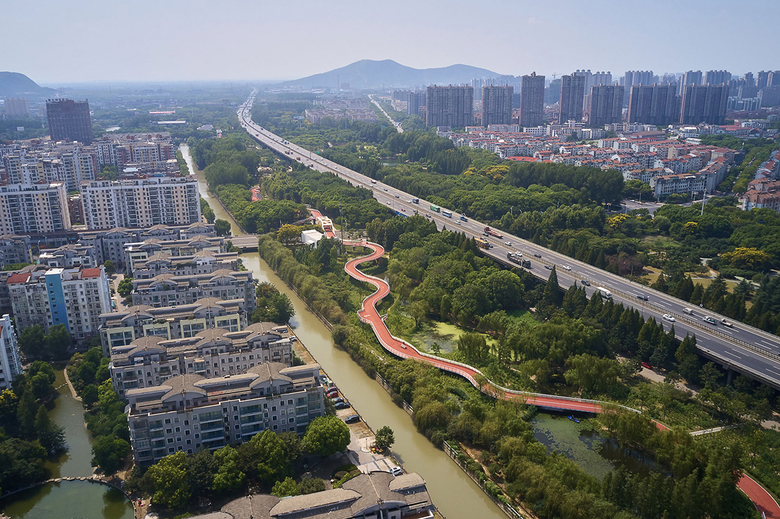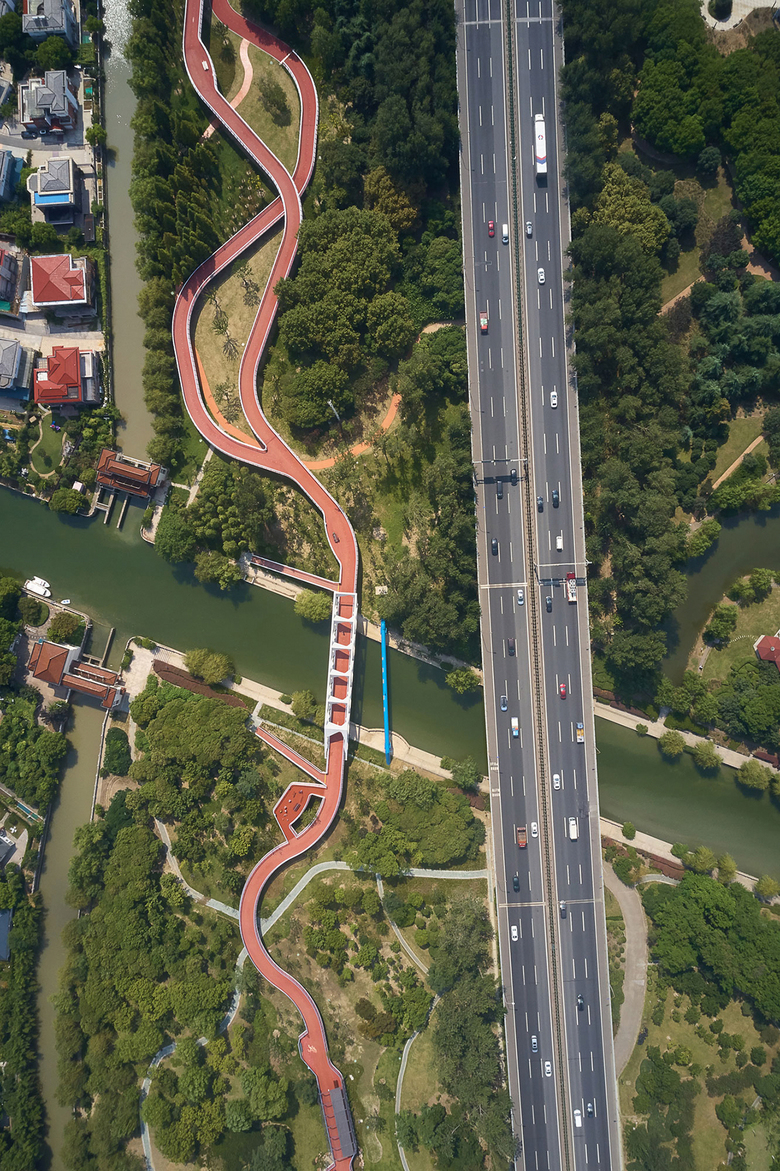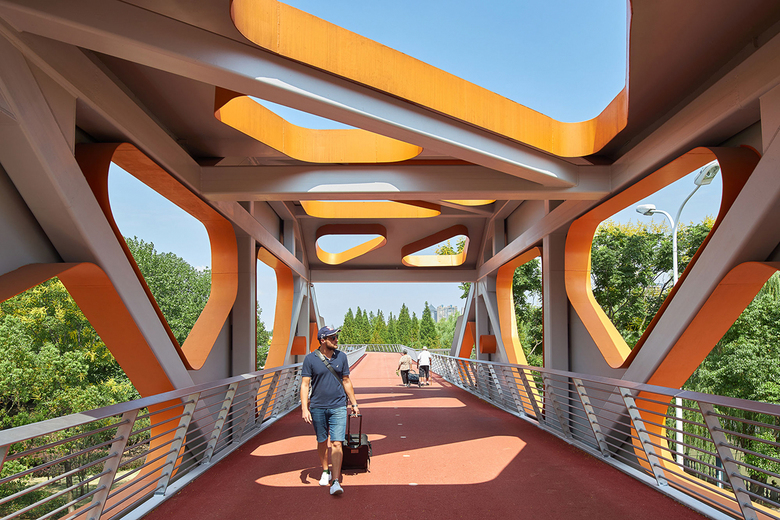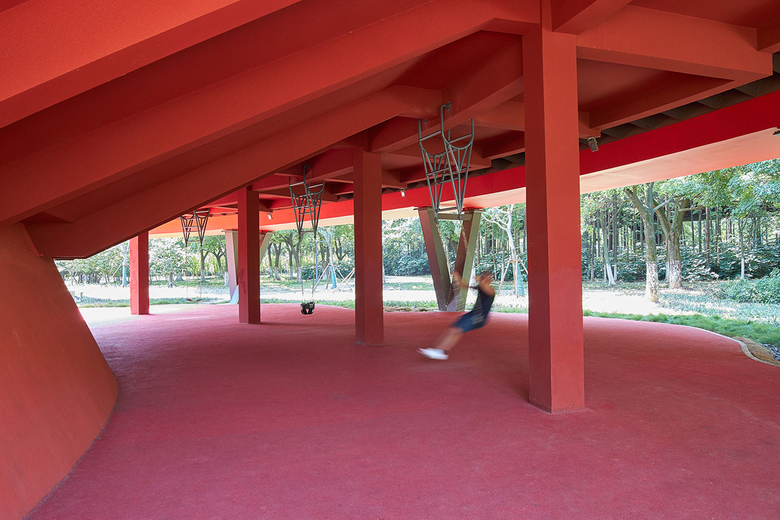Jiangyin Greenway
BAU (Brearley Architects + Urbanists)
14. 1月 2020
Photo: Pavel Shubskiy - Egghead Photo
The Jiangyin Greenway belongs to a growing movement in China towards healthy, sustainable transportation and urban enjoyment. Infrastructure of this scale has an opportunity – or more correctly a responsibility – to create meaningful places in the city. It is also seen as an opportunity for Jiangyin to assert itself as a creative, progressive and livable city.
Consequently, it will consist of four clearly identifiable segments, each with a unique response to the spirit of the place in which it is located. The north segment of the loop has already been built and passes through the docklands parks. It responds to the history of shipbuilding and its port function. This project, the eastern segment of the loop, leads to the Yangtze River, the river to which Jiangyin owes its existence. Consequently, this segment will respond to the significance of the Yangtze River.
Location: Jiangyin, Jiangsu, China
Client: China Construction City Development Ltd in Jiangyin
Architect: BAU (Brearley Architects + Urbanists)
- Project Team: Guo Liexia, Gao Weiguo, Wu Xiaojian, Pan Linglu, Li Zheng, Yu Zhirui, Rong Yu, Lei Tao, Pablo Jimenez, Manuel Jose Godoy Alvarez, Fang Qun, Huang Fang, Steve Whitford, Peter Felicetti(Concept stage engineer), James Brearley
Engineering: Shanghai Lin Tongyan Li Guohao Civil Engineering Consulting Co., Ltd.
Photo: Pavel Shubskiy - Egghead Photo
More than a pathThis project is more than just an elevated walkway, it seeks to generate better urban spaces, order previously random and disconnected decision making, engage with the best of contemporary aesthetics; solve problems, extend local iconography, be poetic, be cost effective, and open up social opportunities.
Photo: Pavel Shubskiy - Egghead Photo
The river storyThe Yangtze River is a remarkable natural phenomenon. Like many natural phenomena, the hustle and bustle of everyday life of the city can mean this remarkable piece of landscape can often be taken for granted. This new piece of urban infrastructure is a great opportunity to remind the public of the extraordinary aspects of this mighty river. The greenway path has become a scaled model of the Yangtze River with the cities and tributaries along it length becoming plazas and balconies along the greenway. At these locations visitor information boards place these events in to the larger river story.
Photo: Pavel Shubskiy - Egghead Photo
StitchingThe freeway is lifted off the ground for it entire length of the site. Contrary to what one would think, and thanks to this enlightened engineering decision, the freeway is not a barrier in the city. However, the park in which it sits is not as helpful in keeping the city well connected. In fact this linear park with its emphasis on a major north-south connection becomes a frustrating barrier to east-west circulation.
A careful analysis of desire lines and shortcuts can rejuvenate the park with activity, make the park safer, and make the city more efficient. The stitching paths also ensure that the green way is connected to the rest of the park and to the adjacent streets and pedestrian circulation networks.
Photo: Pavel Shubskiy - Egghead Photo
Responsive AND surprisingThe path provided in the brief was a thoughtful and gentle response to the existing paths and the substantial well established planting material. The design of this project is a clear and legible response to this path, with: solid and transparent balustrades providing privacy or views; sound walls near the freeway for the comfort of the pedestrians; arbors to provide shade and enclosure; widenings with seating at locations overlooking lakes and canals; landmark bridges with sculptural trusses framing views for pedestrians; stairs located at street intersections to link existing pedestrian paths to the new greenway; and surprising additional programs that make the adjacent city programs work even better.
Photo: Pavel Shubskiy - Egghead Photo
Place-making AND programmingIt is said that place is space with memories attached. And that memories can’t be attached without articulation. Consequently the journey along this greenway is articulated with a number of variously scaled events; an amphitheatre for performances or relaxing on; a raised plaza with permanent sound instruments for all to play; an exercise playground with nets, slides and a gentle climbing ramp for all ages, to name a few – all providing the clarity and legibility to become memorable places.
Photo: Pavel Shubskiy - Egghead Photo
Full of potentialThis design also locates key places for optional programs and the building envelopes of these options describe how best to take advantage of their location adjacent to both the existing road and pedestrian system, and the new greenway. These optional programs can assist in making place and also generate more activity in key locations making the greenway a safer place to be. Rent from these commercial programs could also contribute to the running costs of the greenway. Potential programs include: bicycle hub for repair and sales; café-bar-restaurants; market; and gym sports shop.
Photo: Pavel Shubskiy - Egghead Photo
An integrated kit of partsThere are two fundamental ways to generate large-scale forms and spaces – by adding small things together or by starting with a large thing and extracting pieces from it. The addition process often leads to an aesthetic of accretion, which has at its core the idea of the articulation of different elements. This can lead to a non-integrated result.The subtraction process leads to an integrated approach, because every element is either the result of the subtraction of something or it is itself the subtracted element. It is the subtraction process that this project explores.
The design of this project is based on a kit of parts, but parts of an integrated whole not an assemblage of disparate elements. This kit of parts allows diversity but retains construction simplicity and cost control.
Photo: Pavel Shubskiy - Egghead Photo
StructureThe entire greenway is built in steel and utilizes pre-fabricated to reduce the impact on the park.
A steel structure with a colored bituminous concrete screed gives the greenway both the potential for prefabrication and a durable low-maintenance, long-wearing surface.
Photo: Pavel Shubskiy - Egghead Photo
Membranes, trusses and cradlesBridge spans vary and can exceed the efficient 32m span of the greenway. To deal with this issue, the bridges explore three structural principles: perforated membranes, trusses, and suspension systems.
There are two membrane options: one where the greater mass sits mid-span and acts as an arch; the second option has mass at the supports and acts as a tensile structure. The truss system turns the familiar Warren truss into a series of inclined membranes, and the suspension option explores a propped cradle dynamic. These options provide variety of combinations to assist in making each bridge a unique landmark in the city.













